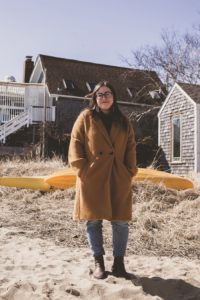Laura Cresté still has Mead notebooks full of the nature poems she started writing around age six. She wrote one after watching a seagull attack a crab while on the beach in Hampton Bays in eastern Long Island, where she spent summers as a child.
“I’ve just written a four-page poem about a dead whale,” says the 30-year-old poet, now a fellow at the Fine Arts Work Center, “so perhaps not that much has changed.” Cresté is giving a reading in FAWC’s Stanley Kunitz Room on Saturday, March 19 at 7 p.m., alongside fiction writer Zeynep Özakat.

Cresté graduated in 2013 from Bennington College, where she studied literature, then got an M.F.A. in poetry at New York University in 2016. It’s not Cresté’s first time in Provincetown: she briefly visited as an undergraduate. “It was January, deep in the off season, and it felt beautiful and remote in the same way that this winter feels to me now,” she recalls.
Cresté grew up in Rutherford, N.J. Her grandparents are from Argentina, and her grandfather, Carlos, published award-winning plays under the pseudonym Alberto Adellach.
Adellach left Argentina in 1976, when a military dictatorship overthrew President Isabel Perón and the Argentine Anticommunist Alliance blacklisted Adellach for his leftist politics. Between then and 1983, the U.S.-backed Operation Condor, a violent campaign against anyone thought to be associated with socialism or the Peronist government, killed an estimated 30,000 people.
Cresté did not speak Spanish as a child but has been practicing on Duolingo every day. She’s hoping to be able soon to read her grandfather’s work.
Complex family dynamics, especially between siblings, fascinate Cresté. Her chapbook You Should Feel Bad, published in 2020 by the Poetry Society of America, starts with a poem called “Sisters,” set partially in “the summer my sister let the tomcat in, chipmunk thrashing/ in his mouth,/ and our mother shouted Jesus Fucking Christ,/ so the neighbors never said hello again.”
“The imagery of the suburbs looms large for me,” says Cresté. Neighbors, back yards, outdoor showers, and family cats populate her poems. In “Against Nostalgia,” she’s riding “down the canopied/ side streets in someone’s mother’s minivan.”
Though many of Cresté’s poems wax nostalgic for the landscape of her upbringing, “Against Nostalgia” is her reminder to herself “to push back against that tendency to idealize the past by reminding myself that I wasn’t particularly happy.
“Parts of it were beautiful,” she admits. “I was depressed, but I also loved staying home from school, making myself Lipton soup.” But she writes, “No one ever beat me up and no one I loved had died.” More of Cresté’s time was her own, but she was still mired in the sometimes painful process of becoming herself.
Cresté says her FAWC fellowship “is a gift of time and space to create, uninterrupted, for seven months in a community of other writers and artists. I haven’t had this much free time since I was a child, and it’s been transformative for my writing.”
She and a few other poetry fellows meet weekly to drink tea and discuss their work. “The self-imposed deadlines of our meetings have been so helpful for keeping me accountable,” Cresté says. “And the line edits I receive from my fellows make me excited to get started on the next draft.”
Otherwise, Cresté fills her days with reading, writing, stirring big pots of soup, and walks across the breakwater. That walk inspired her poem about the dead whale. A baby humpback washed up at Long Point in November. Researchers think it likely died of entanglement.
“It was horrible to see, but I don’t imagine I’ll ever be that close to a whale again in my life, so I couldn’t help but keep looking,” Cresté says. She returned to the carcass several times and started writing a poem that “became a whirlpool that sucked in all the other things I was thinking about at the time: anxiety about climate change, conversations I was having with other fellows, what it means to be in a community with artists,” and a December Covid outbreak among almost all the FAWC fellows.
The final poem in Cresté’s chapbook, “Poem for My Children Born During the Sixth Extinction,” is steeped in pre-nostalgia for a present where four seasons come and go, honeysuckle blooms in June, and polar bears roam the ice caps. Whereas today’s kids learn the seasons, “My children will learn hurricane and wildfire,” writes Cresté. “It is summer and then it/ is winter.”
Cresté recognizes the beautiful moments that stick firmly into memory, the ones that make it possible to imagine loveliness in a bleak future. As she writes in “Sixth Extinction,” she “knew our children’s lives would get worse every year./ We thought they might like to be here anyway,/ to give them oceans, ice cream, optic nerves, the flowers, and all/ their names.”
Memory Palace
The event: A reading by Fine Arts Work Center writing fellows Laura Cresté and Zeynep Özakat
The time: Saturday, March 19 at 7 p.m.
The place: Stanley Kunitz Room, Fine Arts Work Center, 24 Pearl St., Provincetown; or online at fawc.org
The cost: Free
